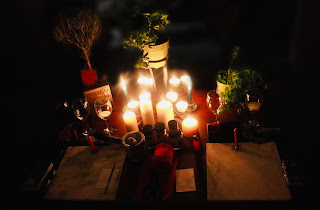Hopeful Thinking - Saturday, March 9, 2019 - Prayer and Spellcasting
Sometimes we need physical tokens which are emblematic to our concerns or desires. If we need a bit of luck we often tend to carry a physical symbol of that desire around with us. A little worry stone, a feather, a prayer card. A lock of hair.
Gruesome as it sounds in retrospect, I had many a “lucky” rabbit’s foot in my pocket as a child. They were the actual chopped off feet of rabbits. Each with a brassy cap covering the end of the bone, its fur still intact, dyed in various festive jewel tones which served to only further decorated the horror rather than attempt to disguise it. We used to joke, “Not so lucky for the rabbit!”
When I was stressed I would comfort myself with the softness of the little bit of fur in my pocket. For some strange reason, even though I am sensitive enough about things like that to prefer my chicken boneless, I still loved those little rabbits’ feet. I truly believed they brought me luck and protection.
Nearly all of us are superstitious in one way or another. Even a beard on a athlete in the playoffs is a form of prayer some take very seriously. It’s not so far as you might think from spellcasting.
Many times over the years I have attended neopagan ceremonies celebrating the full moons and harvest times. Without exception, I leave these events with a feeling of solidness and contentment. Recognizing and honoring our connection to all nature and creation through ritual is something too many go without. We feel unstrung without knowing why. Nature cures all in the end.
One of the many fascinating aspects of modern paganism is its use of ritual. It’s fascinating for two reasons. The second of which is the level of detail. Rituals are always creative, typically include an array of physical objects and are very meaningfully composed. The first is that there is no one right way of doing them.
Modern earth-centered religions do not have any one central authority. Many practitioners have deep opinions, sometimes very strong ones, about the way a ritual should be performed and with what tools, even clothing. They construct elaborate rituals for new initiates. Others are more easy-going and allow their practice and membership to be as fluid as the element of water they honor.
Rituals of modern earth-centered traditions in the west are influenced by a variety of sources such as the ancient Norse, Celtic, Aboriginal and Indigenous American, mixed with wisdom from Eastern philosophy. One chooses the ingredients of their own soup.
Since there’s no one right way of conducting a ritual or prayer, it points to the fact that what matters most is you. You have to choose the language with which you will speak with the Ultimate Reality. If a spoon means ‘gratitude’ to you, then that’s the best symbol for ‘gratitude’ when speaking to God.
Take the time to recognize your own symbolic vocabulary and then pray for yourself and others using that language. Consider expanding upon your language using elements of your own faith co-validated by ideas from other traditions. There’s value to this.
We have a tough time getting out of our heads in order to get into them. If we wish to tap into the literal wiring of our brains, as much as into the wider cosmos, we typically need physical objects to focus on so we stay clear of our tendencies to give up on the seedling just before it breaks the surface.
Jade plants, for instance, are symbols of growth and renewal. They are totems of financial health. Keeping one on your desk at work or in your home—with the intention of it serving this purpose—is prayer. It is ritual. It is giving a form of intent that more deeply solidifies our brain wiring on the subject exactly because of its physical realness. We understand a physical plant. It’s not as alien to us as the concept of higher powers.
A succulent, green jade tree, each leaf bulging and heavy with nourishment, requires no great stretch of the imagination to consciously connect it with the idea of blessing. Brain wiring around concrete ideas like “plant” are in this way infused with notions of good fortune, making it easier for us to imagine and therefore experience. The bandwidth of our prayer is enhanced.
There is an entire world of spiritual languages to select from. Be wary of those who caution you away from exploring them for yourself. Maintain a holy curiosity. Next time you’re praying for something, think about casting a wider net. Loving ideas are never in conflict.




Comments
Post a Comment